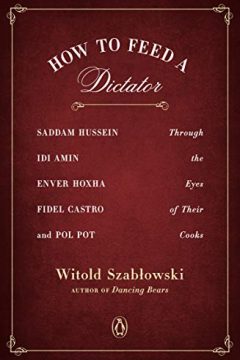How to Feed a Dictator
 Witold Szablowski
Witold SzablowskiAnthony Bourdain meets Kapuściński in this chilling look from within the kitchen at the appetites of five of the twentieth century’s most infamous dictators, by the acclaimed author of Dancing Bears.
What was Pol Pot eating while two million Cambodians were dying of hunger? Did Idi Amin really eat human flesh? And why was Fidel Castro obsessed with one particular cow?
Traveling across four continents, from the ruins of Iraq to the savannahs of Kenya, Witold Szabłowski tracked down the personal chefs of five dictators known for the oppression and massacre of their own citizens—Iraq’s Saddam Hussein, Uganda’s Idi Amin, Albania’s Enver Hoxha, Cuba’s Fidel Castro, and Cambodia’s Pol Pot—and listened to their stories over sweet-and-sour soup, goat-meat pilaf, bottles of rum, and games of gin rummy. Dishy, deliciously readable, and dead serious, How to Feed a Dictator provides a knife’s-edge view of life under tyranny.
Praise for How to Feed a Dictator
“Fascinating . . . Moving . . . Reveal[s] the complicated web of feelings (and morals) involved in cooking for a despot . . . A chilling read.” —The Washington Post
“Lively . . . Szabłowski . . . devoted three years to tracking down and personally interviewing the cooks . . . [and] provide[s] historical context for the worlds in which these tyrants operated and makes sure we remember how evil they were, even as we read about their fondness for grilled cheese with honey or refusal to eat dried elephant meat.” —The Wall Street Journal
“Anecdotal and easy-going . . . Throughout, the chefs are rendered as compelling and complex characters. Szabłowski’s skill is to hang back from judgment . . . Like his compatriot, the literary non-fictioneer Kapuściński . . . Szabłowski lets his subjects speak for themselves . . . [offering] behind-the-scenes glimpses of hypocrisies, capriciousness and bullying . . . [and] posing . . . universal questions about collusion and responsibility. . . . Szabłowski is a limpid and gently brilliant storyteller.” —Financial Times
“A fascinating journey through four continents . . . Szabłowski paints a gripping picture of the autocracy seen through the eyes of tyrants’ personal chefs. It’s delicious and devastating at the same time.” —Karolina Wiercigroch, quoted in National Geographic
“A piquant food travelogue with dimensions that are both comic and Faulknerian, with court intrigue and betrayal so sudden that the book may as well have been titled In the Kitchen With Machiavelli . . . [The] moral ambiguity . . . is both the fascination and the horror of the book. . . . Chilling.” —Bloomberg
“Riveting, and utterly convincing . . . Viscerally transports us to an alien time, an alien place . . . The dictators are reanimated, transformed from creatures of mythology back into flesh and blood. . . . Exceptionally juicy.” —The Sunday Telegraph
“Winning . . . Szabłowski’s dogged pursuit across continents was rewarded. . . . This book tells all that we know about the power of good suppers, whoever they are fed to.” —The Spectator
“Unique and startling—an amazing book. Here’s Abu Ali, describing the fish soup with tomatoes, almonds, and apricots that was Saddam Hussein’s favorite. And here’s Otonde Odera, reminiscing about the steak and kidney pie that won him a huge pay raise from Idi Amin. These accounts of killers at table, delivered in the cooks’ own words and placed in historical context by Szabłowski, are all the more hair-raising for Szabłowski’s matter-of-fact prose. He isn’t writing about monsters, but monstrous human beings—and that’s the scary part.” —Laura Shapiro, author of What She Ate and Julia Child: A Life


